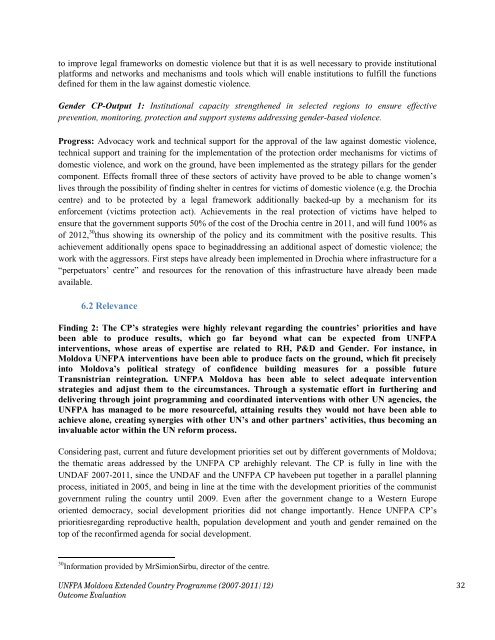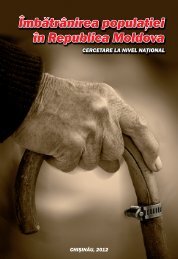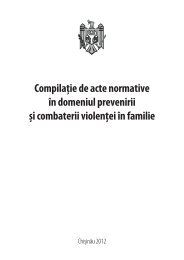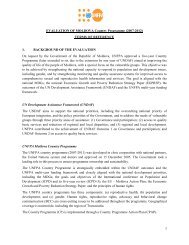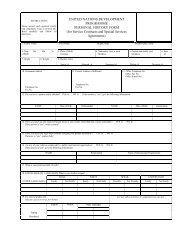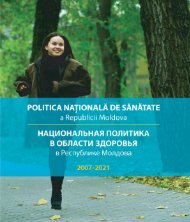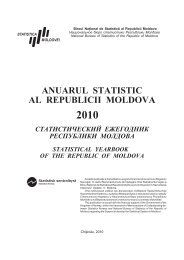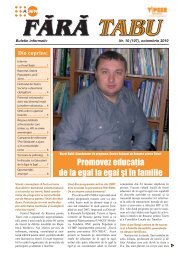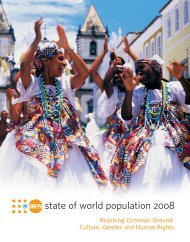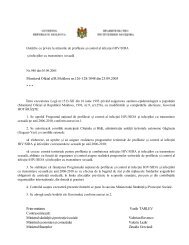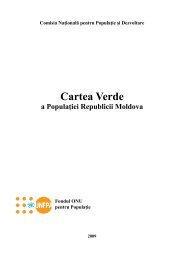Country Programme (2007-2011/2012) evaluation - UNFPA Moldova
Country Programme (2007-2011/2012) evaluation - UNFPA Moldova
Country Programme (2007-2011/2012) evaluation - UNFPA Moldova
Create successful ePaper yourself
Turn your PDF publications into a flip-book with our unique Google optimized e-Paper software.
to improve legal frameworks on domestic violence but that it is as well necessary to provide institutional<br />
platforms and networks and mechanisms and tools which will enable institutions to fulfill the functions<br />
defined for them in the law against domestic violence.<br />
Gender CP-Output 1: Institutional capacity strengthened in selected regions to ensure effective<br />
prevention, monitoring, protection and support systems addressing gender-based violence.<br />
Progress: Advocacy work and technical support for the approval of the law against domestic violence,<br />
technical support and training for the implementation of the protection order mechanisms for victims of<br />
domestic violence, and work on the ground, have been implemented as the strategy pillars for the gender<br />
component. Effects fromall three of these sectors of activity have proved to be able to change women’s<br />
lives through the possibility of finding shelter in centres for victims of domestic violence (e.g. the Drochia<br />
centre) and to be protected by a legal framework additionally backed-up by a mechanism for its<br />
enforcement (victims protection act). Achievements in the real protection of victims have helped to<br />
ensure that the government supports 50% of the cost of the Drochia centre in <strong>2011</strong>, and will fund 100% as<br />
of <strong>2012</strong>, 30 thus showing its ownership of the policy and its commitment with the positive results. This<br />
achievement additionally opens space to beginaddressing an additional aspect of domestic violence; the<br />
work with the aggressors. First steps have already been implemented in Drochia where infrastructure for a<br />
“perpetuators’ centre” and resources for the renovation of this infrastructure have already been made<br />
available.<br />
6.2 Relevance<br />
Finding 2: The CP’s strategies were highly relevant regarding the countries’ priorities and have<br />
been able to produce results, which go far beyond what can be expected from <strong>UNFPA</strong><br />
interventions, whose areas of expertise are related to RH, P&D and Gender. For instance, in<br />
<strong>Moldova</strong> <strong>UNFPA</strong> interventions have been able to produce facts on the ground, which fit precisely<br />
into <strong>Moldova</strong>’s political strategy of confidence building measures for a possible future<br />
Transnistrian reintegration. <strong>UNFPA</strong> <strong>Moldova</strong> has been able to select adequate intervention<br />
strategies and adjust them to the circumstances. Through a systematic effort in furthering and<br />
delivering through joint programming and coordinated interventions with other UN agencies, the<br />
<strong>UNFPA</strong> has managed to be more resourceful, attaining results they would not have been able to<br />
achieve alone, creating synergies with other UN’s and other partners’ activities, thus becoming an<br />
invaluable actor within the UN reform process.<br />
Considering past, current and future development priorities set out by different governments of <strong>Moldova</strong>;<br />
the thematic areas addressed by the <strong>UNFPA</strong> CP arehighly relevant. The CP is fully in line with the<br />
UNDAF <strong>2007</strong>-<strong>2011</strong>, since the UNDAF and the <strong>UNFPA</strong> CP havebeen put together in a parallel planning<br />
process, initiated in 2005, and being in line at the time with the development priorities of the communist<br />
government ruling the country until 2009. Even after the government change to a Western Europe<br />
oriented democracy, social development priorities did not change importantly. Hence <strong>UNFPA</strong> CP’s<br />
prioritiesregarding reproductive health, population development and youth and gender remained on the<br />
top of the reconfirmed agenda for social development.<br />
30 Information provided by MrSimionSirbu, director of the centre.<br />
<strong>UNFPA</strong> <strong>Moldova</strong> Extended <strong>Country</strong> <strong>Programme</strong> (<strong>2007</strong>-<strong>2011</strong>/12)<br />
Outcome Evaluation<br />
32


